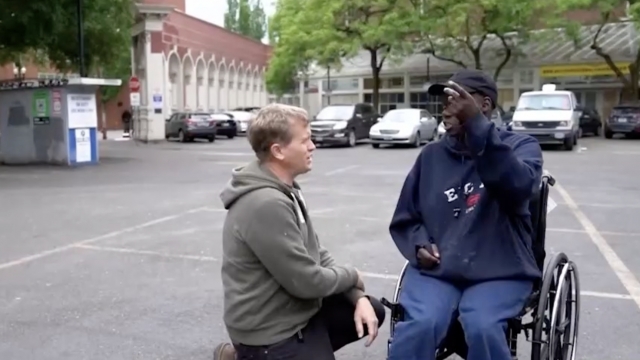For 28 years, Kevin Dahlgren has been working as a drug and alcohol counselor and advocating for people living on the streets of the Pacific Northwest, currently focusing 100% on his hometown of Portland, Oregon.
Dahlgren believes many of the solutions currently put in place by governments, like Housing First, are missing the mark because, he says, too few people are listening to the unhoused.
"They're sharing with us they don't understand why they're not actually getting the real help," he said. "This is why a majority of homeless — this is another controversial thing, but it's true — will say no to housing because they've tried it, and they don't want to be isolated and away from their family, which is their street family, and usually that's when their depression kicks in."
Almost every day, he's walking the streets of Portland, trying to make connections and trying to listen. He documents his work on his social channels, giving a platform to current realities those on the street live — realities like that of D, a homeless man.
"Out here [with] mental health and stuff and drugs and everything, and it's like your emotional maturity is stunted, like you stopped growing in a lot of ways," D said. "Problem solving skills seem to fade away ... so it's like you see people almost regress."
D, like so many, wanted to share his story, but he wasn't ready to accept help.
SEE MORE: How art is helping homeless youth find their way
"There's a mistrust in the system," Dahlgren said. "There's a mistrust because nobody is out here actually talking with them."
Dahlgren is unconventional and sometimes controversial in his field. Along with being against Housing First, he's openly critical of Oregon's decriminalization of drugs, the giving away of clean drug supplies and believes many policies today just make it easier to live on the street.
"It starts with outreach. It starts with boots on the ground ... That is step one, the most important step. They're on step eight or nine saying, 'Let's build these multimillion dollar apartment buildings, but when we move you in, we have no expectations of you,'" he said.
It can sound harsh , but he believes the fentanyl crisis has created a dire need for a tough love approach. To him, he's going by what he sees and what he hears, like what he heard from Tony, an unhoused man speaking about the horrors of fentanyl.
"Perhaps it's like a remedy, in other words, for people who really need to die and who can't die, who are stuck in a circumstance," Tony said.
Tony said he would like more outreach workers to take the time to hear him out.
"I can't be out here forever. I'm supposed to be enjoying life, like to be normal, like to have normal opportunities of happiness and to express joy," Tony said.
There is no one solution, and for the solutions that are currently put into place, there are flaws, as society continues to try to figure out the nation's unhoused and addiction crisis.
But for Dahlgren, he hopes to make others think about what progress could be made if more people just listened.
Trending stories at Scrippsnews.com




